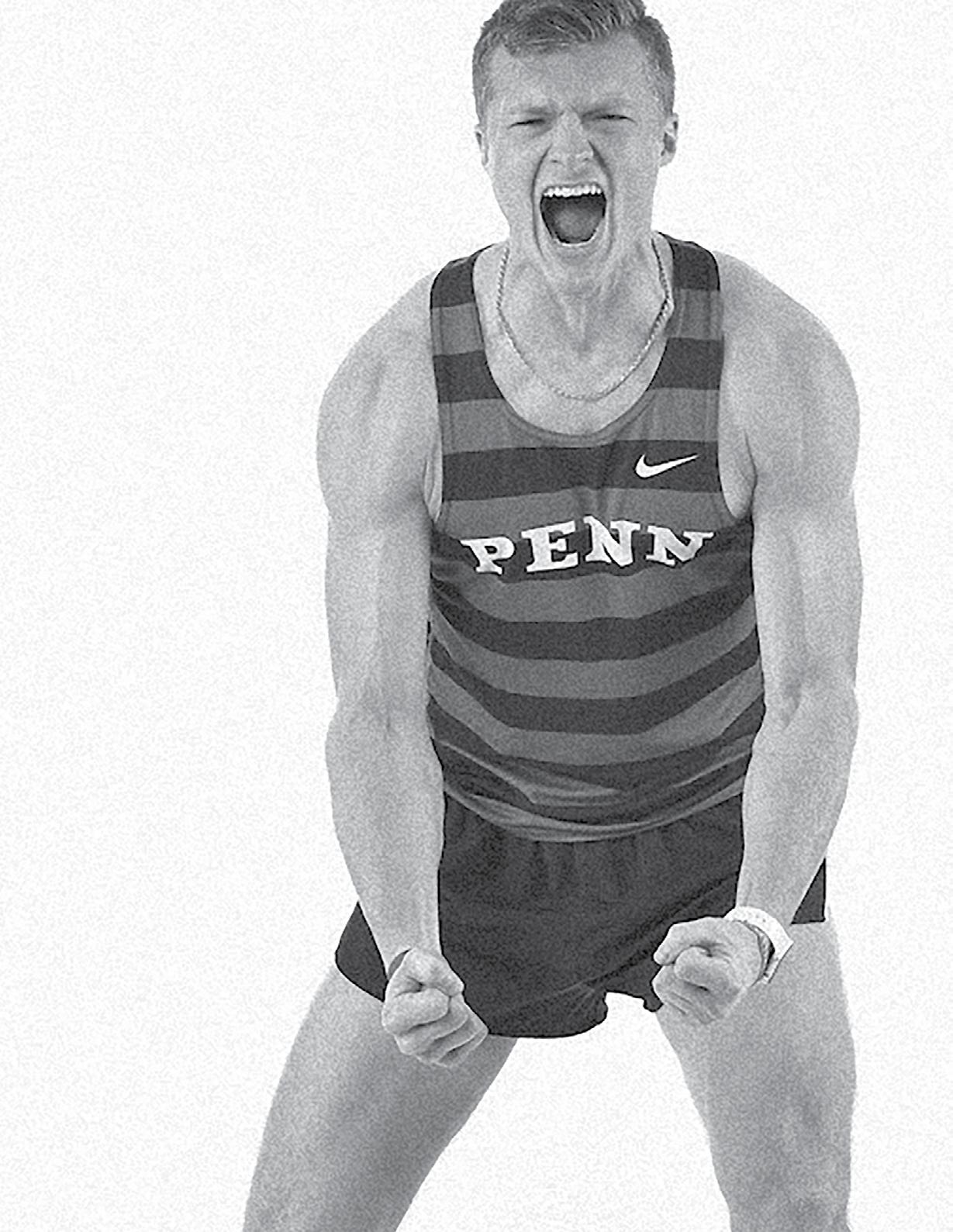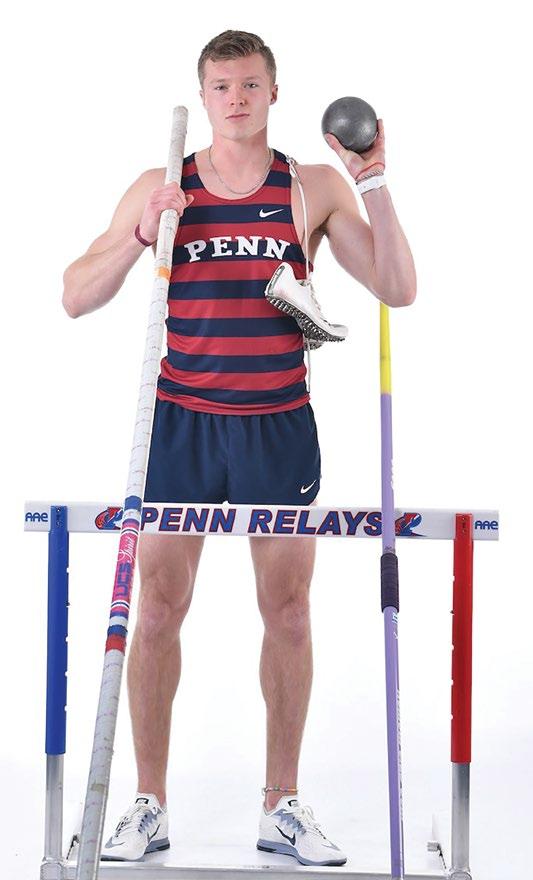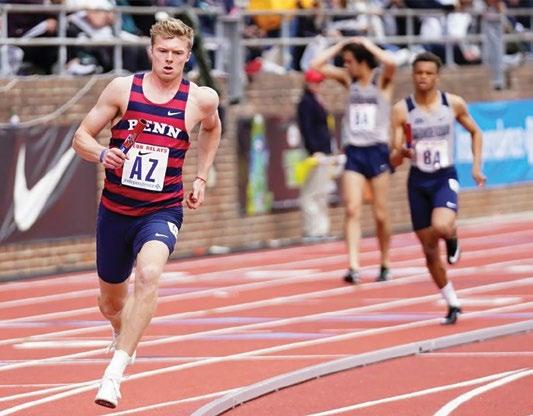
6 minute read
Evan Lee ’16 Finds a Silver Lining in the COVID-19 Pandemic
Alumni Feature: Evan Lee ’16 Finds a Silver Lining in the COVID-19 Pandemic
By Cathy yingling Chapelle ’87
Advertisement
Evan Lee ’16 was gearing up for his final season competing for the University of Pennsylvania as one of the top college decathletes in the country when his plans were upended by the coronavirus pandemic. Evan was a stand-out during his time at Penn; he holds Penn’s indoor heptathlon record of 5,507 points, and scored the eighth-highest point total in Penn’s outdoor decathlon history, with 7,060 points.
At first, Evan was incredibly disappointed as the Ivy League became one of the first conferences to cancel spring sports. Soon, however, Evan found a silver lining in a graduate program at Duke University, another chance to compete in the sport he loves, and an extra year to train for his Olympic dream.
I recently sat down—remotely—with Evan to hear more about his journey.
How did you feel when the shutdown happened in March due to the pandemic? It took me completely by surprise. I was home for spring break. The track and field indoor nationals were scheduled for the second weekend of spring break and I was hoping to be competing there, so I hadn’t planned any sort of a vacation for the break. At first I was frustrated and disappointed because the Ivy League was the first college conference to cancel the spring season, about 48 hours before any others cancelled, so I was wondering “why is this only us?” I was in shock for a couple of days, but then it became apparent that all college sports were being cancelled. I talked to my coaches and eventually realized that this could be a good opportunity for me, because the decathlon really favors experience, so I could potentially get another year of training. I still had one more year of eligibility, so I joined the transfer portal to start considering my options. I would have loved to have stayed at Penn, but unfortunately the Ivy League has a rule against grad students competing, and I was on track to graduate in the spring.
Did you ever consider giving up on your final season, since you were graduating?
Not really. Track and field has been such a huge part of my life; I knew I wasn’t done yet. I really felt like I had unfinished business.
How did you deal with life in quarantine? Were you able to continue training?
Quarantine was the first time in years when I had nothing to train for. How do you train when you don’t know what’s in your future? And I had no facilities to use. I finally started to train for a half marathon; I was really motivated and I was racking up a lot of miles, and finally my body just said “no.” Ultimately I had to reorient myself to get back to training for the decathlon.

You’re currently in a graduate program at Duke University, pursuing a Master’s Degree in Bioethics and Science Policy. How did you decide that would be the best option for you?
After I joined the transfer portal, I spent a very long day fielding calls from various programs and coaches. I have a habit of pacing when I’m talking on the phone, and I walked about 17 miles that day talking to coaches. I also talked to my parents about my options and prayed about it, and finally selected Duke as my best option. I have been very grateful for my parents’ and my brother Christopher’s support throughout this process and
my athletic career.

How has it been going since you started at Duke?
It’s been great. My classes are a hybrid - two out of five are in person, and I’ve felt really comfortable going to class in person with the COVID-19 protocols in place.
For the track team things have felt fairly normal, as well; we reported August 10 and we’ve been in training six days a week. We’re tested once a week, and most of our training has been outdoors. When we are inside for weight training or other activities, we’re wearing masks.
How do you balance competing in sports at such a high level with your studies?
It’s tricky. In season I have to be more organized and motivated. I have a lot less time to waste, so I have to be very conscious of the amount of time I have for training, for school work, and for sleep. It’s really a matter of being disciplined and clear about my priorities; it took me a couple of years in undergrad to figure out the balance.
Some have mentioned Olympic potential for you, and of course the Olympics have been postponed to 2021. What will an extra year mean for you?
It definitely helps to have an extra 52 weeks to train and improve. Experience is key for the decathlon; it takes time to reach your peak in 10 events. Getting to the Olympics would definitely be a dream come true, but I think a more realistic goal would be to compete in the Olympic Trials next summer in Eugene, Oregon. I’ve set several goals for this year - being named an All-American, being among the top in the NCAA, and competing at the Olympic Trials.
How did Park Tudor prepare you to succeed in college, on the track, and now in grad school?
Park Tudor was phenomenal in preparing me for college. Coach (Ryan) Ritz was a fantastic coach; he loves track and field and talking about form and technique, as well as results. He shared that love of track with me, and while he pushed me hard, he kept me healthy and I never experienced burnout. He really focused on me as a holistic track athlete, teaching me the importance of diet, sleep, and doing my homework not only for my classes but for track.
(College Counselor) Mr. (Joe) Fumusa was so helpful during the college recruitment process; he was almost like an agent with the energy he brought to it. He helped me set my sights higher than I might have on my own.
I was very challenged academically at Park Tudor and I learned to study hard, and also learned how to ask questions. I realized that it’s not just about learning information for a test - I also learned how to think critically. Park Tudor also helped me with time management. PT students have the opportunity to be involved in a lot of different activities. In addition to track and field, I also participated in tech theatre, so I learned how to balance getting my homework done with all of those other activities.
In addition, I formed great relationships at Park Tudor. I developed friendships with like-minded people in my classes, and I always felt like I had teachers who were looking out for me.
What’s next for you? What are your career goals?
Depending on how this season goes, I might continue competing and training post-collegiately. I’m considering coaching and possibly trying to compete on the World Team. I’ll complete my Master’s program in December, 2021, and I’m planning to go to medical school in the fall of 2022, so I’ll have a gap between completing my Master’s and starting med school.
What advice do you have for current Park Tudor students who might want to follow in your footsteps?
My mantra which has motivated me and given me an edge, is “Leave no doubt.” That means do everything to the best of your ability. When you’re training, work really hard - leave everything out there. In the classroom, do your best - leave no doubt that you could have done better.
I also think that doing everything right every day adds up to making big gains. If you do the little things right, the big things go right.
Finally, have big aspirations. If you don’t think you can do something, you won’t. Ultimately, you need to believe in yourself.
If you would like to connect with Evan Lee, you can reach out to him on Instagram - @evanlee5.





